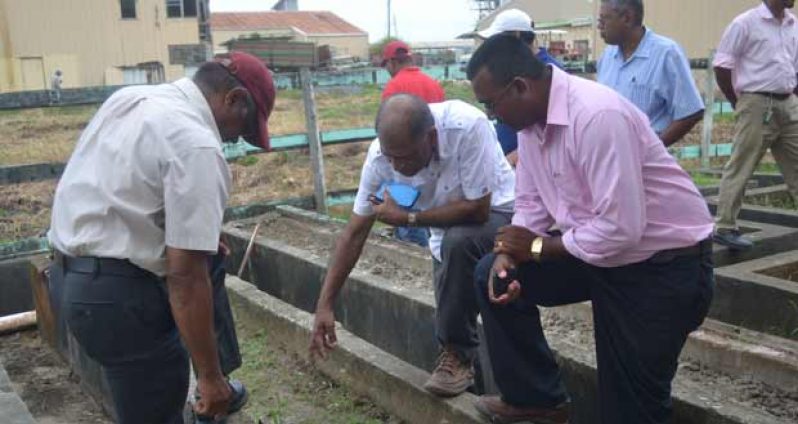–as Burma continues research on yield level, climate tolerance
SCIENTISTS at the Burma Rice Research Station have been instrumental in the past in releasing a new line of rice varieties, which has proven not only to enable farmers to harvest more bags of paddy per acre, but can withstand harsh climatic conditions.According to a recent press release, research to improve yield levels and tolerance to changing climate conditions are ongoing, with the Rice Research Station expected to introduce new rice varieties soon.
GRDB 9, 10 and 11, released over the last three years, have become the star of the industry – the consensus from rice farmers across the country, reaping yields of up to 60 bags per acre.
Agriculture Minister, Dr. Leslie Ramsammy, on Wednesday, visited the research station to check on the ongoing progress made thus far, and to get a hands-on approach to some of the techniques used by the scientists.
While touring the facility, scientist Dr. Mahendra Singh, explained some of the tests done on the F4, F6 and F 8 (salt resistant) and the new line of varieties, which is expected to be released and tested by a target group of 20 farmers in the initial stage.
“Over the years, we (scientists) at the Research Station have been working to ensure that we don’t only release new and improved varieties of rice but also varieties which can withstand heavy climatic conditions and still produce exceptionally well,” he said.
Singh noted that GRDB 11 and 12 has been proven successful in garnering more bags of paddy per acre, while GRDB 9 is known to be more feasible.
Apart from tests being done to have more varieties released, the Research Station has also developed various pedigree nurseries where testing for resistance to pest and disease, tolerance to lodging and blast resistance varieties are ongoing.
“The Research Station has come along over the years and their work coupled with investment, and farmers input have seen the industry propelling…it is the hope of the Government to continue to work with the Research Station through GRDB to have the station evolve by incorporating new techniques,” Minister Ramsammy was quoted as saying.
One of the focal issues in agriculture is climate change, and cognizant of its effects, the developments of new rice varieties are necessary.
Climate change impacts negatively on the availability, stability, access and utilization of food security and according to Minister Ramsammy the development of rice varieties which are blast resistance and has high milling qualities can be not only beneficial to millers and farmers, but the industry as a whole.
“Food security is the most vulnerable and as such, it is important that we (Government) continue to push for the right varieties of rice to be developed; hence the reasons for pushing for climate smart agriculture,” Dr. Ramsammy said.
The Guyana Rice Development Board (GRDB) has also incorporated the use of the six-point practice which has also proven successful with farmers across the rice-growing regions.
The six improved crop management practices include: date of planting, density, treatment of seeds, weed control, fertilization and water management.
These techniques fall under the Ministry of Agriculture’s programme of having farmers adopt proper farm husbandry, the release added.



.jpg)









